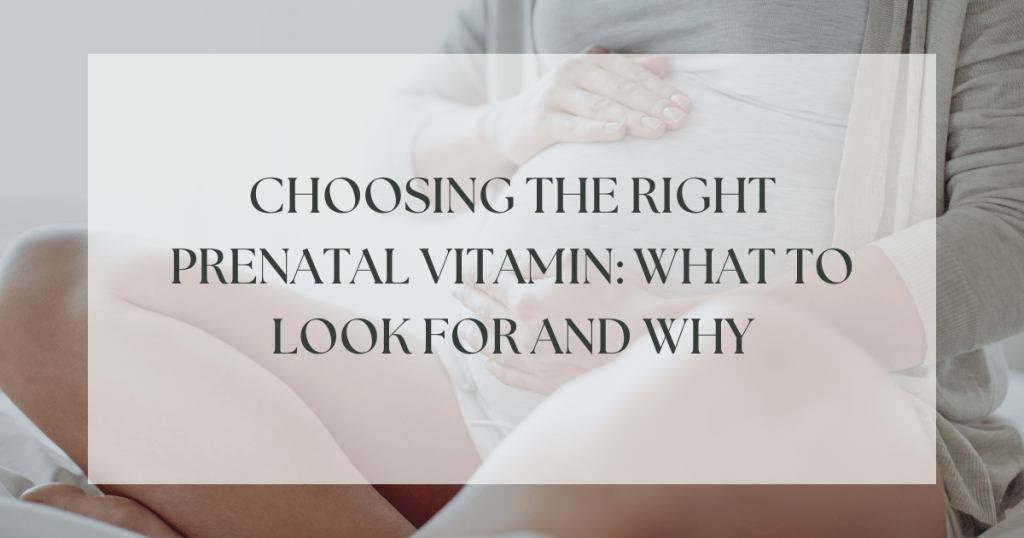Wondering what to look for in a prenatal multivitamin? While it doesn’t have to be fancy or expensive, finding the right prenatal vitamin is crucial for supporting a healthy pregnancy. In this blog post, we’ll delve into the key nutrients to seek in a prenatal multivitamin and explain why they are essential for both you and your baby’s well-being.
- Folic Acid: Folic acid is perhaps the most critical nutrient during early pregnancy as it helps prevent neural tube defects in the developing baby. Look for a prenatal multivitamin that contains at least 400 ug (0.4 mg) of folic acid. However, it’s important to avoid prenatal vitamins with 1,000 ug folic acid or more, as excessive intake may not provide additional benefits and could potentially be harmful.
- Vitamin B12: Vitamin B12 is necessary for proper red blood cell formation and neurological development. Choosing a prenatal multivitamin that includes vitamin B12 is essential, particularly for vegetarians and vegans who may have limited dietary sources of this nutrient. Vitamin B12 is vital for preventing deficiencies that can be masked by folic acid supplementation.
- Vitamin D: Vitamin D plays a crucial role in bone health and immune function for both you and your baby. Ensure that the prenatal multivitamin provides at least 400 IU of vitamin D. If you have limited sun exposure or your healthcare provider determines that you have low vitamin D levels, they may recommend higher doses or additional supplementation.
- Iron: Iron is essential for producing red blood cells and preventing iron deficiency anemia. Look for a prenatal multivitamin that contains 15-27 mg of iron. However, iron supplements can sometimes cause constipation or other gastrointestinal symptoms. If this occurs, splitting the dose in half and taking it twice daily may help minimize these side effects.
- DHA: DHA (docosahexaenoic acid) is an omega-3 fatty acid that supports the development of the baby’s brain and eyes. Aim for a prenatal multivitamin that contains at least 300 mg of DHA. If your chosen prenatal multivitamin does not provide this amount, consider taking a separate DHA supplement, especially if you’re not consuming three servings of fatty, low-mercury fish weekly.
- Calcium: Calcium is vital for maintaining strong bones and teeth, as well as supporting proper muscle and nerve function. Look for a prenatal multivitamin that provides 200-300 mg of calcium in addition to calcium from your diet. It’s important to note that dietary sources of calcium include cow’s milk, fortified plant-based milk beverages, yogurt, cheese, canned fish with bones (such as salmon and sardines), beans, tahini, almonds, tofu prepared with calcium sulfate, kefir, kale, collard greens, broccoli, and more.
- Vitamin A: While vitamin A is essential for fetal development, excessive intake can be harmful and may lead to birth defects. Ensure that the prenatal multivitamin contains less than 5,000 IU of vitamin A to avoid the risk of toxicity. Consult with your healthcare provider if you have any concerns or questions about vitamin A supplementation.
- Nutritious Foods: While a prenatal multivitamin is important, it should never replace a balanced and nutritious diet. Remember to continue including a wide variety of nutrient-rich foods in your meals throughout your pregnancy. Fruits, vegetables, whole grains, lean proteins, and healthy fats should all play a role in providing essential nutrients for you and your baby.
Choosing the right prenatal multivitamin is an important step in supporting a healthy pregnancy. Look for a prenatal multivitamin that includes adequate amounts of folic acid, vitamin B12, vitamin D, iron, DHA, calcium, and a safe level of vitamin A. These nutrients are crucial for the development of your baby and maintaining your own well-being during pregnancy.
However, it’s important to remember that a prenatal multivitamin should never replace a balanced and nutritious diet. While it can help fill nutritional gaps, it’s always best to obtain nutrients from whole foods whenever possible. Incorporate a variety of fruits, vegetables, whole grains, lean proteins, and healthy fats into your meals to provide the necessary vitamins, minerals, and antioxidants for optimal health.
Before starting any prenatal multivitamin, consult with your healthcare provider to ensure it is suitable for you and your specific needs. They can provide personalized recommendations based on factors such as your medical history, dietary habits, and any existing nutrient deficiencies.
In summary, when choosing a prenatal multivitamin, prioritize the inclusion of key nutrients such as folic acid, vitamin B12, vitamin D, iron, DHA, and calcium. Ensure that the levels are appropriate and safe for pregnancy. Remember that a prenatal multivitamin is a supplement and should be complemented with a well-rounded diet consisting of nutritious foods. By taking care of your nutritional needs, you are giving yourself and your baby the best possible start on the journey to a healthy and thriving pregnancy.


